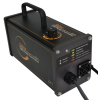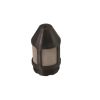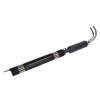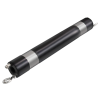Solinst Model 415 12V Submersible Pump
Features
- Very simple to operate and adjust from high to low flow rates
- Smooth, short (6" nominal) pump design avoids getting stuck in wells
- Fits inside Nominal 2" OD Sched. 40 or 80 PVC Pipe
- Free ground shipping
- Expedited repair and warranty service
- Lifetime technical support
- More
Overview
The Solinst 12V Submersible Pump provides an efficient means of purging and obtaining groundwater samples from monitoring wells. The 12V Submersible Pump and 12V Pump Controller are lightweight, portable, and easy to set up, deploy and operate.
Application
The Pump’s sleek, short design ensures it fits easily down wells without hang-ups. The Solinst 12V Submersible Pump is capable of pumping groundwater from 36.5 m (120 ft) below ground surface, with flow rates up to 13.5 L/min (3.6 US gpm) in shallow conditions.
Mechanics
The Solinst 12V Submersible Pump system comprises the 12V Submersible Pump with cable, 12V Pump Controller, sample tubing (sold separately), and a user-supplied power source. The 12V Submersible Pump cable simply connects to the 12V Pump Controller, which then clips to a 12V power source. The 3/8" (9.5 mm) ID LDPE sample tubing is pushed onto the barbed fitting on the 12V Pump.
Design
Convenient LED lights on the Controller indicate the status of the 12V Submersible Pump system, including high or low battery voltage, proper battery connection, normal operation and maximum flow rate. It has an easy-to-reset circuit breaker (no fuse to replace). Simply turn the dial on the 12V Pump Controller clockwise to increase the voltage to the Controller, which turns the Pump’s motor faster and increases the flow rate.
Sampling Depth: As much as 36.5 m (120 ft) below ground surface
Flow Rates: Up to 13.5 L/min (3.6 US gpm)
Pump Cable Length: 130 ft (40 m)
Pump Cable Weight: 3.5 kg ( 7.8 lbs)
Wetted Materials: ABS pump body, 304 stainless steel motor, impeller and eyebolt, polypropylene hose barb, nitrile/buna o-rings and seals, PVC jacket electrical wire
Pump Size: 4.78 cm OD x 13.97 cm long (1.88" x 5.5")
Pump Weight: 0.8 kg (1.8 lbs)
Controller Size: 33 cm x 13 cm x 17 cm (13” x 5” x 6.5”)
Controller Weight: 3.4 kg (7.5 lbs)
Controller Cable Length: 1 m (3.5 ft)
Power Source: 12V Deep Cycle 60 amp AGM Battery or larger, or vehicle or marine battery.
Voltage Required: 12.5V–15V at source
Power Draw: 20mA (when dial is OFF), 3A (dial is at 1) to 36A (dial is at MAX (10))
Max. Run Time: Continuous, as long as Pump fully submerged during operation
Warranty: 12V Submersible Pump: 90 Days; 12V Pump Controller: 3 Years
In The News
Wave-Powered Buoy Deployed in Puget Sound
While the development of solar-powered monitoring systems has improved access to real-time environmental data, solar power is still limited by low light conditions, such as poor weather, nighttime, or high-latitude environments. To supplement these incumbent power solutions at sea, Ocean Motion Technologies has developed a small-scale ocean wave energy system that can be directly integrated with existing data buoy platforms. Not only does wave energy supplement solar power during periods when the buoys are limited by light availability, but it also allows data buoys to perform beyond their current power capacities.
Read MoreLong-Term Monitoring in the Chautauqua Lake Watershed
With a widely developed shoreline, Chautauqua Lake experiences influxes of non-point source pollution that have historically impacted the health of the lake. The Chautauqua Lake Association (CLA) has been monitoring the lake for over two decades, reporting on changes that have occurred over the years. A pair of local lake advocates, Jane and Doug Conroe, have lived on the lake for over 40 years and have played an important role in establishing monitoring programs and facilitating consistent data collection throughout the watershed. Doug has been involved with the Chautauqua Lake Association (CLA) since the pair moved to the area in 1980, and is currently serving as the Executive Director.
Read MoreNo Red Herrings: Data Driving the Largest Salt Marsh Restoration in the NE USA
The Herring River system encompasses around 1,000 acres in the Towns of Wellfleet and Truro, Massachusetts. In 1909, the Chequessett Neck Road dike was built at the river’s mouth, drastically limiting tidal flow. Today, it’s one of the most restricted estuaries in the northeastern United States. As a result, the area has suffered environmental decline, including poor water quality, hypoxia, lower pH, and salt marsh degradation. In 2023, the Town of Wellfleet received $14.7 million from NOAA’s Office of Habitat Conservation to fund the Herring River Restoration Project (HRRP). Francesco Peri, President and CEO at Charybdis Group LLC, uses a network of NexSens data loggers to monitor water level and water quality on the Herring River.
Read More

















